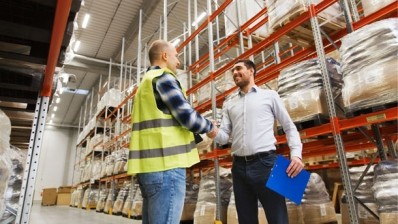Food supply chain efficiency gains from new data systems

Investment in the latest supply chain software systems can help food and drink manufacturers mitigate losses stemming from fluctuating supply, demand and waste, while meeting rising demand for more data and greater transparency.
Data quality issues are costing the retail sector as much as £2bn in lost sales, according to Ian Walters, engagement manager for retail and consumer packaged goods at GS1 UK, the standards body that works with retailers and manufacturers globally to improve supply chain efficiency and quality.
“Many food and drink manufacturers are facing enormous cost pressures, which are affecting margins,” said Walters.
“This is made worse by the need to forecast accurately when faced with increasing fluctuations in demand, caused by changing shopping habits and smaller baskets.
“Therefore, there is a need for the industry to increase efficiency and remove avoidable costs, particularly from the supply chain. But many manufacturers are often hindered by older legacy systems that lack flexibility, so the problems remain.”
Data quality problems (Back to top)
In the sector, quality is an issue for both supply chain and product data, said Walters. He cites, for example, inconsistencies in product or case dimensions between suppliers and retailers.
“The problem is even worse when it comes to more complex data like ingredients or nutritional data,” he added. “Getting this wrong impacts customer satisfaction and sales.”
Yet, software solutions have developed rapidly in recent years, said Richard Jones, chief technology officer at Linkfresh Software, which supplies enterprise resource planning (ERP) systems, including Microsoft Dynamics add-on packages, for the fresh food sector.
“The biggest issue we find is we’re dealing with very aggressive supply and demand issues every day,” said Jones. “The timescales are incredibly tight, and they are dealing with a very aggressive set of quality criteria.”
Linkfresh assists its clients with implementing safeguards and due diligence throughout the supply chain.
“People come to us for pack house solutions, extending back to the field where people are picking the produce,” he said. “If you can identify a problem before it reaches the pack environment, you can put it right.”
In the US, for example, combine harvester operators use handheld devices to identify the class of produce before it goes out to customers.
Use of OData, the open data protocol pioneered by Microsoft, gives businesses tools to make more informed decisions “using data from lots of different places”, said Jones.
“For us, it’s very important to improve efficiencies in the supply chain and help people to do more with less and good IT really does that,”
Another supplier of Microsoft Dynamics ERP systems, Columbus, cites its advantages as including the immediate capture and analysis of data, the opportunity to identify future supply chain innovations, and facilitating collaboration between suppliers and customers.
“As the need for improved costs and efficiency grows, together with the need to find more innovative ways to delight the customer, manufacturers are looking further and further throughout the entire supply chain to add value,” said Simon Noakes, practice director for process consultancy at Columbus.
“For many, this means moving away from traditional ‘silo’ approach manufacturing models, instead favouring full integration of the supply chain from start, right through to the point of delivery to the customer, and analysing all stages in detail to find where technology can support improvements.”
One example would be a manufacturer using the Internet of Things to transfer data collected on the shopfloor to complement a centralised ERP system for instant analysis, said Noakes. “This data can then be accessed via user portals or business intelligence tools, to enable real-time decision making.”
End-to-end traceability (Back to top)
Andy Archer, regional vice president for the UK and Ireland at Epicor Software, recommends that manufacturers seeking end-to-end traceability invest in an industry-specific rather than industry-agnostic ERP system.
“Food production firms need to be able to track their products right from the raw ingredients and any packing material that comes into contact with the product to the finished goods and vice versa,” said Archer.
“In order to do so, data from every point in the supply chain must be recorded to provide an audit trail.”
Further, he adds, the right ERP system helps businesses accurately forecast and report production, consumption and fulfilment, reduce spoilage and generally improve efficiencies and save on costs.
Eric Carter, solutions architect at Indigo Software, a specialist in warehouse management software supplied to clients such as Dairy Crest and Greene King, also identifies integration as vital.
“Food manufacturers are now making and shipping orders of lower volumes, which need to be replenished more frequently, yet also having to absorb any cost increases,” he said.
“Technology such as a warehouse management system that helps manufacturers to improve efficiency, reducing the incidence of errors and ensuring warehouse operatives are fully utilised and productive, is essential to being able to cater to these new shopping habits without seeing a dip in profitability.”
Other systems, such as NT Assure’s Smart Supplier, offer businesses with long and complex supply chains a collaborative platform.
Users of the system pay for a licence, and then create a bespoke template to bring their suppliers together.
“Businesses can share elements of food safety and compliance,” said Tim Betts, chief executive and founder of Smart Supplier.
“The reason we created the system six years’ ago was the systems available then were clunky. We wanted to create a system that was simple and intuitive.”
Demand for data (Back to top)
With manufacturers facing increasing demand for high volumes of data from provenance, traceability and sustainability to allergens, Smart Supplier operates in a similar way to a smartphone app. “Saving the user time compared with systems already on the market was one of the key drivers,” said Betts.
“And there are non-food elements on the platform too such as sharing trade and service agreements, and you have access to it all on the go.”
Betts predicts sugar content to be the next big push in terms of data collection across food and drink man,ufacturing.
Authenticate IS, meanwhile, operates as a cloud-based collaborative platform aimed at facilitating total transparency for its users via the mapping and managing of data – thus mitigating risks.
“We believe if you can’t map it, you can’t manage it,” said Rick Sanderson, chief commercial officer of Authenticate IS.
“We can map the entire food chain as far back as the specific farm supplying produce, grain, milk or meat, anywhere in the world. We think of it as the LinkedIn of food compliance.”
New data requirements can also be added to the platform, such as enhanced food safety and traceability demands post ‘horsegate’; allergens; and the ‘transparency in supply chains’ clause of the Modern Day Slavery Act, said Sanderson.
Under the clause, manufacturers must ensure slavery and human trafficking is not taking place in its supply chains.
“This could be daunting if you don’t know who or where your indirect suppliers operate,” said Sanderson.
“Especially when you consider how much food, ingredients and spices come from Africa and Asia.”
Some firms are still using Excel to manage their supplier lists, when they could be benefiting from collaborative software passing any changes throughout the chain.
“So, instead of having to chase for and record information from their suppliers, technical managers can focus on using the information, which I believe is a smarter way of working,” he adds.
GS1 UK is, meanwhile, pushing for industry to agree a consistent set of processes and standards. It recently formed a Retail Grocery Advisory Board representing 80% of the UK retail grocery market from Asda and Tesco to Coca Cola, Kellogg, Müller, Nestlé and Unilever.

















